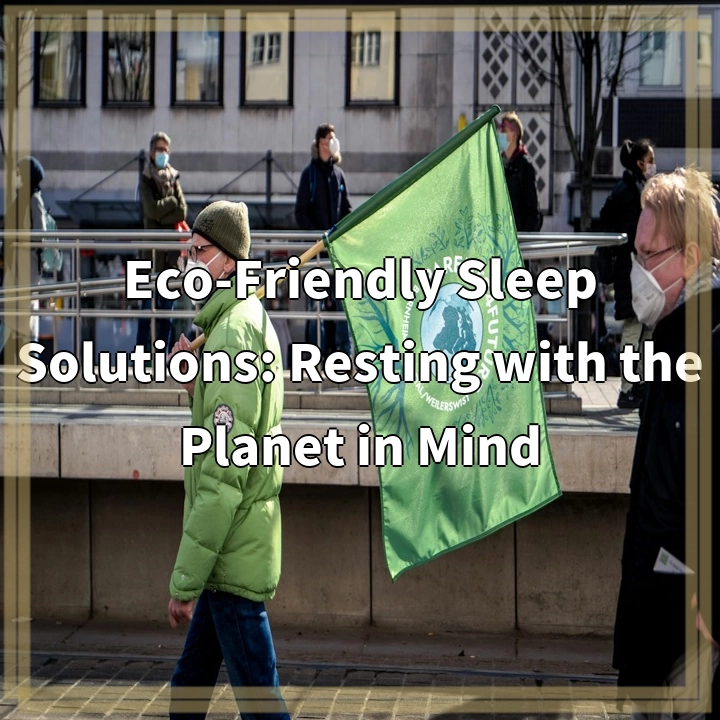
What are Eco-Friendly Sleep Solutions?
Eco-friendly sleep solutions refer to practices and products that are designed to promote a restful sleep while minimizing negative impacts on the environment. This involves considering the materials used in bedding, furniture, and sleep accessories, as well as implementing sustainable habits and technologies.
Real-World Problems Associated with Conventional Sleep Practices
Pollution and Waste from Mattress Production
Conventional mattresses are often made with synthetic materials that require intensive manufacturing processes, leading to pollution and waste generation. Harmful chemicals, such as flame retardants, are commonly used in these mattresses, posing risks to human health and the environment.
Energy Consumption of Traditional Bedding
Traditional bedding products, such as mattresses, require significant amounts of energy for their production, transportation, and disposal. This contributes to greenhouse gas emissions and exacerbates climate change.
Chemical Off-Gassing
Many conventional bedding items, including mattresses and pillows, are treated with chemicals that can release volatile organic compounds (VOCs) into the air. These VOCs have been linked to respiratory problems and can negatively impact indoor air quality.
Environmental Impact of Bedding Materials
The production of bedding materials like cotton and synthetic fibers involves high water and pesticide usage. Additionally, the disposal of these materials at the end of their life cycle adds to landfill waste.
Health and Comfort Considerations
Conventional bedding may not prioritize health and comfort factors, leading to poor-quality sleep and potential health issues. Lack of breathability, inadequate support, and exposure to allergens can disturb sleep patterns and contribute to sleep-related problems.
Disposal Challenges
Conventional bedding, particularly mattresses, can be difficult to dispose of responsibly. Mattresses are bulky, non-biodegradable items that often end up in landfills, impacting waste management systems and taking up valuable space.
Solutions and Sustainable Alternatives
Individuals can opt for eco-friendly sleep solutions that prioritize sustainability and minimize the environmental and health impacts associated with sleep practices. These include:
1. Organic and Natural Bedding Materials
Choosing bedding made from organic and natural materials, such as organic cotton, hemp, or bamboo, helps reduce pesticide use and promotes a healthier sleep environment.
2. Sustainable Mattresses
Selecting mattresses made from natural and sustainable materials, such as organic latex, organic wool, or recycled fibers, can reduce environmental impact and enhance sleep comfort.
3. Energy-Efficient Sleep Technologies
Opting for energy-efficient sleep technologies, such as smart thermostats or LED sleep-inducing lighting, minimizes energy consumption and promotes a more sustainable sleep routine.
4. Recycling and Upcycling
Exploring options for mattress recycling or upcycling can divert mattresses from landfills and contribute to a circular economy.
5. Eco-Friendly Sleep Practices
Adopting sustainable sleep habits, such as using natural sleep aids instead of synthetic ones, keeping the bedroom well-ventilated, and practicing proper mattress maintenance, can contribute to a more eco-friendly sleep routine.
By embracing these eco-friendly sleep solutions and making mindful choices, we can rest with the planet in mind, prioritizing both our sleep health and the well-being of the environment.

Sustainable Solutions for Eco-Friendly Sleep
Embracing eco-friendly sleep solutions is crucial for minimizing negative impacts on the environment and promoting a restful sleep. Here are some sustainable alternatives:
1. Organic and Natural Bedding Materials
Choose bedding made from organic and natural materials like organic cotton, hemp, or bamboo to reduce pesticide use and create a healthier sleep environment.
2. Sustainable Mattresses
Select mattresses made from natural and sustainable materials such as organic latex, organic wool, or recycled fibers to minimize environmental impact and enhance sleep comfort.
3. Energy-Efficient Sleep Technologies
Opt for energy-efficient sleep technologies like smart thermostats or LED sleep-inducing lighting to minimize energy consumption and promote a more sustainable sleep routine.
4. Recycling and Upcycling
Explore options for mattress recycling or upcycling to divert mattresses from landfills and contribute to a circular economy.
5. Eco-Friendly Sleep Practices
Adopt sustainable sleep habits like using natural sleep aids, keeping the bedroom well-ventilated, and practicing proper mattress maintenance to contribute to a more eco-friendly sleep routine.
By incorporating these eco-friendly sleep solutions and making mindful choices, we can prioritize our sleep health while also caring for the well-being of the environment.















